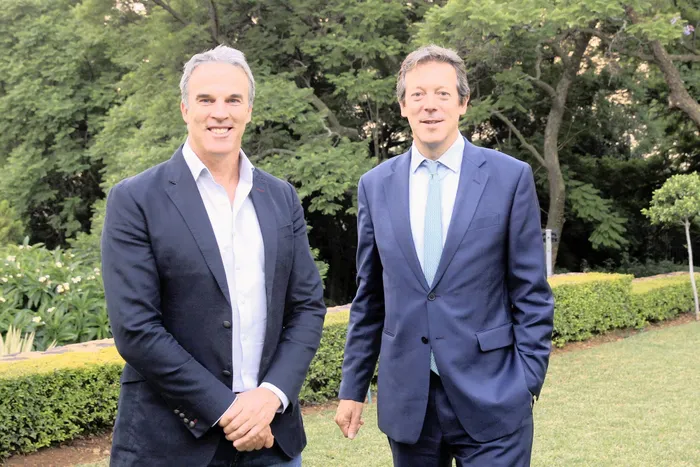Pugh tells of the depths of pollution at sea

Lewis Pugh, left, with the British High Commissioner to South Africa Nigel Casey. Lewis Pugh, left, with the British High Commissioner to South Africa Nigel Casey.
LEWIS Pugh has swum the world’s oceans and at an event in Pretoria he enthralled guests of British High Commissioner Nigel Casey with his experiences. But, aside from being a relaxed storyteller, the urgency of his message about the impact of climate change, overfishing and pollution cannot be ignored.
Pugh, who is a UK/South African citizen, a maritime lawyer, a UN Ocean Advocate and endurance swimmer, has on his many solo swims seen with his own eyes the degradation of the seas. He referred to just some of these and the impression they had made of oceans “on the verge of bankruptcy”, and warned of the dire consequences for “every future generation and the whole of the animal kingdom” if steps were not taken internationally to create large marine protected areas.
First was a trip to the island of Spitsbergen, Norway, at the edge of the Arctic Circle where he does much of his cold water training.
Pugh said that in 2005 the water temperature was 3°C, but when he returned last year, it was 10°C. “You don’t need to be a scientist to realise that if you have warm water moving up the Atlantic against those ice packs, those ice packs are going to melt,” he said.
From there he spoke of an amazing programme to clean up Versova Beach in Mumbai, India. He described meeting lawyer and environmentalist Afroz Shah who had witnessed more and more plastic items being washed ashore, until he and some friends decided to clean it up. “A lot of people laughed at him because that plastic pollution was literally shoulder high,” said Pugh who met Shah about six months into what has now become the world’s largest beach clean-up.
“One weekend we removed 50 huge trucks the following weekend the ocean had vomited up more and more plastic,” he said.
“This plastic is devastating the oceans. Birds are eating it and dying, fish are eating it and dying and, when we eat fish, we are also eating plastic”, Pugh said.
The third visit mentioned was a return visit to the Maldives, one of the lowest lying oceans in the world and rising as a result of climate change. “I will never forget diving into the ocean. It was like I had dived on to the set of Nemo (Finding Nemo).
“Underneath me are all these beautiful tropical fish a shark, a beautiful great manta ray. I swam from island to island along this beautiful coral reef,” he recalled from his first visit. But, 10 years later, the water temperature has risen, the coral had died, and “it was like I was swimming over white rubble”.
Because the coral had died the fish have disappeared and also the natural protection for the island from waves and storms has disappeared.
Another underwater shock came on a trip to the Southern Ocean at the edge of Antarctica, where Pugh swam in the Deception Island caldera (a sunken volcano). The water around the island is full of icebergs, but there is steam coming off the sea, and Pugh said he could not wait to get into the water.
But, it was to be a swim that haunted him, for underneath the water were hundreds and hundreds of whale bones, representing Deception Island’s past at the centre of the whaling industry, and a reminder of the ongoing threat of overfishing, even down to Antarctic krill.
Last but not least, he went “home” to the UK to do his 49-day 530km swim the length of the English Channel from Land’s End to Dover.
“What struck me is how incredibly beautiful the coastline is. But what also struck me is how little wildlife there is. We saw a few dolphins, few birds, one turtle off Falklands, in 49 days, virtually nothing else.”
Pugh highlighted the need for countries to work together to protect the oceans, and create areas where nature would be able to recover, commending the UK for its call for 30% of seas to be designated as marine protected areas by 2030.
During the event, Casey handed certificates to returning Chevening scholars who competed Master’s programmes in the UK last year.